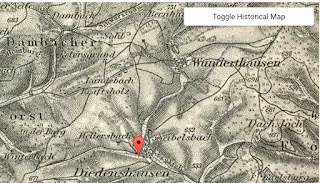Geogen – a “geographical genealogy” website
The free Geogen website (http://legacy.stoepel.net/en/Default.aspx)
can be used to create maps showing the distribution of surnames in Germany
based on entries in the telephone directory. A large concentration of surnames
in a particular area could indicate where the name originated.
Enter the surname of interest in
the input field and click the research button. The German special characters
(ä, ö and ü) are distinct letters, so Müller, Mueller and Muller must be looked
for in separate searches. As well as producing attractive maps that could be a
conversation starter, Geogen may provide the clue to allow the researcher to
break down some brick walls. Enjoy its use!
An example: my great grandmother
Christina E. F. Brohmann was born in a rural area near Eckernförde in Schleswig-Holstein.
While I have been able to find baptisms, marriages and burials for her family,
I have not been able to go back further than her great grandfather Claus
Bromann who was mentioned briefly when his son, Christina’s grandfather, Claus
Wilhelm Bromann was baptised in 1792. Searches for other references to the
older Claus have been unsuccessful!
Entering the Brohmann name into
Geogen revealed the main cluster of people by that name in Altmarkkreis Salzwedel in the Federal State of Saxony-Anhalt with other
individuals scattered across Germany. A similar result came when the variation
Bromann was used. It could be that some Brohmann/Bromann family members moved
to the Salzwedel area years ago in search of work and became established there,
or perhaps the roots of my Brohmann/Bromann family might actually be near
Salzwedel. Further research is clearly called for.







